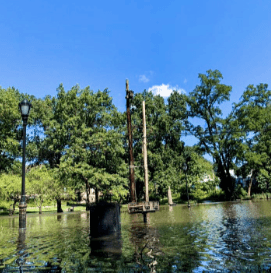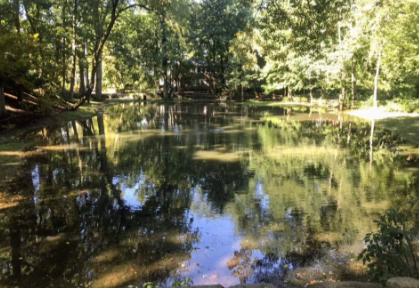By, Jilleen Barrett & Megan LaCreta, Managing Editor / A&E Editor & Staff Writer
While the storm that hit New York City Wednesday night was only the remnants of Hurricane Ida, the impact throughout the city was severe. Manhattan College and its surrounding area were not excluded from the storm’s trail as the community received a flash flood warning and later, a tornado warning.
Sean Curley, a third floor resident of Overlook Manor, had issues with a severe leak in his apartment resulting in a hole forming in the ceiling.
“Around 9:30 pm our ceiling started to leak,” Curley said. “I went downstairs to report it to public safety and they told me I was the 5th person to tell them that a room was leaking. Public safety wrote my name down and told me there was nothing they can do till [the next day].”
Since no one was able to help them, Curley and his roommates attempted to do something about the leak themselves.
“We tried stopping the leak ourselves and even went to the apartment above us,” he said. “We think that the window above us was leaking on the floor above us … We ended up just putting a container down to catch the water and some of the ceiling that fell through the night. We ended up sleeping in the living room in case the leak got worse.”
Curley mentioned that several workers came to fix the leak as well as their air conditioner, which was affected by water damage. The Quadrangle reached out to Physical Plant about how the storm affected their work otherwise but they did not respond in time for publication.

Commuter Gustavo Aguilar had similar issues in his own residence in Yonkers.
“During the heavier parts of the storm [Wednesday night], I was also in the mix of trying to pump out all the water from my basement as many others were doing,” Aguilar said in a message to The Quadrangle. “We were fortunate enough that we weren’t completely flooded in and that we were able to get ahead of the flooding.”
The subways being shut down affected commuters and professors’ travel plans for getting to campus the next morning. Despite the college being prepared for a day of in-person classes after a delay until 11 a.m., the campus had to be closed for the day according to Provost Steven Schreiner.
“The storm impacted the region, which means that there will be students, faculty, and staff who have no power and may be dealing with other issues from the storm, including lack of transportation to campus,” Schreiner wrote in an email to The Quadrangle.
However, there was some confusion about whether or not professors were allowed to hold online classes. Bridget Chalk, Ph.D. explained the faculty received an email which she interpreted to mean that she was not supposed to host online classes that day.
“All classes scheduled for today and this evening are cancelled,” the email from Schreiner read. “This is a regional event where many are without power and dealing with other issues (like flooding). We can not expect everyone to be fully available today. This means you can not ‘require’ your students to attend a ‘remote’ class.”
Chalk explained she felt strongly about cancelling her classes, which she did at 8:30 a.m. before this email came out at 10:40 a.m. She said virtual learning did not make sense when so many people in the area would be without power or dealing with other issues caused by the storm, though she understands why other professors may have held them anyway.
“I also was looking at the news and there’s been massive flooding, all through New York City and all through Westchester there’s tons of power outages, so I also knew that many commuters, one, would not be able to get to campus, and two, might not have access to the internet or to a computer,” she said. “So that all went into my decision before, before the provost email came through to not hold classes today.”

Chalk also noted that the late guidance from administration made professor’s decisions more difficult.
“I think that those professors who did decide to hold remote classes were being conscientious, in that they wanted to make sure that their students weren’t missing any time, and we’re very used to at this point holding remote classes,” Chalk said. “I think that there was a complicated framework for decision making and I explained my decision making to you, but I could see where some of my colleagues might make a different decision, particularly without explicit guidance from the administration beginning early [that] morning.”
Helen Pfeffer was one of the professors who understood the provost’s email differently. As opposed to cancelling her class, Pfeffer held it on Zoom but did not penalize students if they did not attend.
When asked about the decision to close campus, Pfeffer said, “I was not surprised. But I did feel that the information could have been gotten to us more quickly. I’m sure it was the right decision. But I thought we kind of learned about it, almost too late to make plans. I already had my plans for remote class in place. When I got the information from the Provost about everything being canceled, I decided to let things stand and just see how it shakes out.”
Diego Lojano, a junior civil engineering major, usually takes an hour-long commute to campus by bus. However, traffic delays caused by flooding would’ve added nearly another hour to his commute had classes been held in-person.
While Lojano did not have to worry about traveling to campus, he still had one concern: joining a class online. While two of his classes were cancelled, one of Lojano’s professors decided to hold class virtually, causing confusion.
“The actual name of the email [from my professor] was like ‘all classes will be remote today’, so I’m pretty sure [attendance] is supposed to be mandatory,” Lojano said.
Lojano expressed disappointment in the decision to hold class.
“Not many people right now have either power or the resources, like me for example yesterday,” Lojano said.
“My room got flooded, basically my whole apartment … right now I’m at my aunt’s, but there’s other people that don’t have the resources, so they could have been stuck in the flood. Having them go to an online class while they have to worry about their belongings and all their stuff and stuff like that, I don’t think it’s optimal.”
Some students have a more positive view on professors utilizing online learning in certain circumstances, such as Liam Sawyer, a junior computer engineering major.
“Especially since going into junior year, it’s all my core classes now that I need,” said Sawyer. “It’s actual things that I need to know career-wise and everything. So that would have been nice to at least have an option for [remote class].”
Brandan Samaroo, a senior electrical engineering major, felt the same way as Sawyer as he wanted the chance to get settled in during the first week of classes.
“I think personally they should have done at least some classes virtually, just so that we kind of feel a grasp … we could have been even met for like 15 or 20 minutes, at least, just to sort of get to know our professors or just to get settled in a little bit more,” Samaroo said. “I know it wouldn’t be ideal but I think it would have been a little bit better.”
The decision whether to integrate remote techniques, and how to communicate these choices, will be challenges facing the college throughout its return to a fully in-person semester. With the growing threat of extreme weather, as a result of climate change or simply the mid-Atlantic winter, we will have to see what a snow day —or a post-flash flood day— looks like in the Zoom era.

